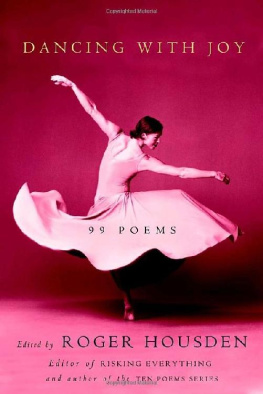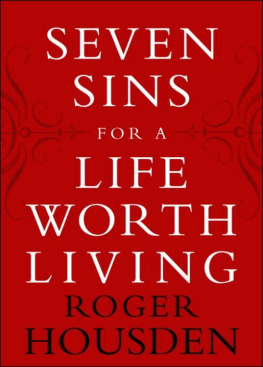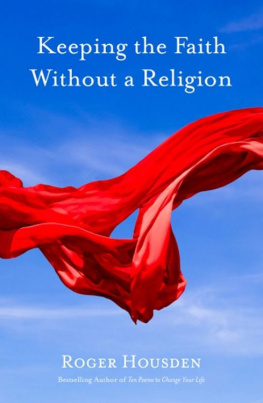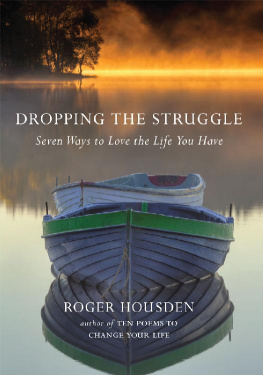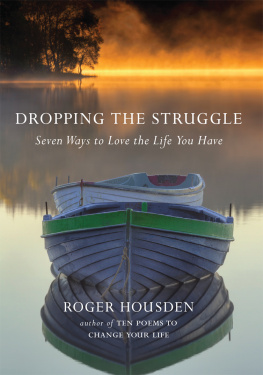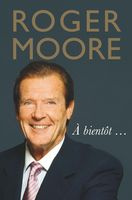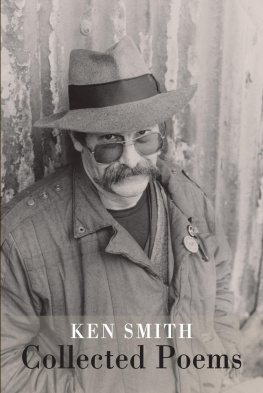Roger Housden - Dancing With Joy: 99 Poems
Here you can read online Roger Housden - Dancing With Joy: 99 Poems full text of the book (entire story) in english for free. Download pdf and epub, get meaning, cover and reviews about this ebook. year: 2007, publisher: Harmony, genre: Romance novel. Description of the work, (preface) as well as reviews are available. Best literature library LitArk.com created for fans of good reading and offers a wide selection of genres:
Romance novel
Science fiction
Adventure
Detective
Science
History
Home and family
Prose
Art
Politics
Computer
Non-fiction
Religion
Business
Children
Humor
Choose a favorite category and find really read worthwhile books. Enjoy immersion in the world of imagination, feel the emotions of the characters or learn something new for yourself, make an fascinating discovery.
- Book:Dancing With Joy: 99 Poems
- Author:
- Publisher:Harmony
- Genre:
- Year:2007
- Rating:5 / 5
- Favourites:Add to favourites
- Your mark:
- 100
- 1
- 2
- 3
- 4
- 5
Dancing With Joy: 99 Poems: summary, description and annotation
We offer to read an annotation, description, summary or preface (depends on what the author of the book "Dancing With Joy: 99 Poems" wrote himself). If you haven't found the necessary information about the book — write in the comments, we will try to find it.
Dancing With Joy: 99 Poems — read online for free the complete book (whole text) full work
Below is the text of the book, divided by pages. System saving the place of the last page read, allows you to conveniently read the book "Dancing With Joy: 99 Poems" online for free, without having to search again every time where you left off. Put a bookmark, and you can go to the page where you finished reading at any time.
Font size:
Interval:
Bookmark:

A LSO BY R OGER H OUSDEN
Seven Sins for a Life Worth Living
How Rembrandt Reveals Your Beautiful, Imperfect Self:
Life Lessons from the Master
Ten Poems to Last a Lifetime
Ten Poems to Set You Free
Risking Everything: 110 Poems of Love and Revelation
(editor)
Ten Poems to Open Your Heart
Chasing Rumi:
A Fable About Finding the Heart's True Desire
Ten Poems to Change Your Life

 CONTENTS
CONTENTS INTRODUCTION
INTRODUCTIONWhy all the embarrassment
about being happy?
asks Wendell Berry in his poem Why, which you will find at the end of this collection. Why indeed! In the novel Snow by the Turkish writer Orhan Pamuk, one of the characters says to another,
You got drunk so you could resist the hidden happiness rising inside of you.
That's an original spin on the usual explanation, that people get drunk to drown their sorrows. What is it about happiness not to mention joythat prompts these authors to suggest it might be so daunting? Could it be that we live in such a difficult, tragic world that it can seem a betrayal or denial of our common darkness to jump for joy? That, in embracing happiness, we somehow turn our back on the sufferings of others and, indeed, on our own sufferingsand so deservedly bring upon ourselves the retributions of guilt? This is precisely the question that Jack Gilbert addresses in his magnificent poem A Brief for the Defense, and it is no accident that this poem features at the beginning of this book.
But there is something else: melancholy, despair, and depression are not only everywhere, an integral part of many people's experience, but they also have cachet. The demon of despair has always seemed more interesting than the angel of joy. Melancholia is weighty with meaning; it seems to be something of substance and conveys its substance onto its subject. If you have had a terrible childhood, you will be more likely to sell your autobiography than if you had an uneventful, happy one. Melancholy has always been equated with creativity and is commonly associated with art and artists, and, perhaps especially, with poets. Bob Dylan, in the recent film of his life by Martin Scorsese, says he has never had any interest in being happy. The hero of the novel Snow is a poet, a melancholic one, and someone says to him in earnest, and as a compliment, that
Only people who are very intelligent and very unhappy can write good poems.
Conventional wisdom tells us that nobody goes to heaven for having a good time. We genuinely think pain is virtuous, which is not surprising given that so many of us worship a crucified Savior. Suffering can indeed be a great purifier, a forger of character, no doubt about that; but joy can free us from our character altogether, at least for a time. It can take us out into the wide world beyond our own self-preoccupations. It can join us to the air and the trees, to other people, to cows and to stones and to the living spirit of humankind itself. It can join us to the china mug of tea in our own right hand.
This book exists to celebrate the many colors and freedoms of joy. Not that the poets represented here do not feel despair or lonelinessof course they dobut they have also known the rarer moments, or even whole periods, of grace, of inexplicable beauty, joy, and ecstatic insight; and from out of those times the most glorious poems have comein resounding rebuttal of the speaker in Snow!
It must be said, though, that joy can even arise out of sadness itself:
Sometimes from sorrow, for no reason,
you sing
says William Stafford in his poem Cutting Loose. Or the Swede, Tomas Transtrmer, who in the poem Allegro says that
After a black day, I play Haydn,
and feel a little warmth in my hands.
Sometimes it is difficult even to tell the one from the other. In her poem Thank You, My Fate, Anna Swir has this to say about making love:
I don't know whether this is joy
or sadness, I don't understand
what I feel, I'm crying,
I'm crying
I'm unworthy, how beautiful
my life.
Joy is an upwelling of life, of spirit, a blossoming of freedom. It is what we are here for. It is wholehearted, full-bodied, all-encompassing. In a moment of joy, you are no longer a kingdom dividedbetween right and wrong, this way or that way, should or shouldn't. And yet joy and melancholy exist on a spectrum and are not separate. This is why I have made the unlikely choice of including Pablo Neruda's poem To Sadness in a collection called Dancing with Joy. This book does not have the pink spin of candy floss. Its joy is substantial, even though it is often as light as air. And because the poems have weight as well as wings, they can afford to share space with a poem like this, in which Neruda reminds us that a surfeit of sunlight and honey can sometimes require its opposite to make sense of its beauty:
give me
your black wing,
sister sadness:
I need the sapphire to be
extinguished sometimes and the oblique
mesh of the rain to fall,
the weeping of the earth
Neruda's poem gives ballast, as well as an added lift, to all the joy surrounding it on the other pages.
Whereas melancholy can sometimes weigh heavy with meaning, joy often seems to have no reason at all. It comes unbidden, and, as William Blake reminds us, leaves the same way. With no reason or purpose beyond itself, joy has no proper function in a utilitarian world. With no function, it has no intrinsic use. Joy is useless! It won't get us anywhere! Which may be another reason we tend to be wary of it. Joy exists in the present moment and has no plans for the future. It is not serious. When we are joyful, our plans and schemes and intentions all fly out of the window. When we are joyful, we have no future as such, because we are fully here in the present experience. You can only think about joy after it has come and gone. You can't train it to stay longer; nor can you work out how to repeat the experience. Joy, finally, is beyond our control, even if it might be true that we can learn how to become more prone to it. This is how Raymond Carver, in his poem Happiness, puts it:
It comes on
unexpectedly. And goes beyond, really,
any early morning talk about it.
Or as Mark Strand says in Eating Poetry, inspired by an evening in a library in the company of poetry books,
I romp with joy in the bookish dark.
Joy may indeed be useless, but it is also contagious. Any one of these pages may catch you alight. Anything, or nothing at all, can jump-start the tide of joy in our veins. For Wislawa Szymborska, it is a dream, or, in another of her poems, the joy of writing; for Robert Bly, being in the company of his ten-year-old son; for Stephen Dunn, coming home to his family; for Gerald Stern, it is dancing or a grapefruit at breakfast; for Kim Addonizio, it is a red dress; for Dorianne Laux, kissing; for Billy Collins, a cigarette; for Kabir, for Rumi, for Hafiz, it is spiritual joy. For Walt Whitman, it is friendship; for Wordsworth, solitude; for Keats, beauty. It is, finally, a sudden influx of life felt in all of its fullness, all of its transient beauty, its awakening joy.
Font size:
Interval:
Bookmark:
Similar books «Dancing With Joy: 99 Poems»
Look at similar books to Dancing With Joy: 99 Poems. We have selected literature similar in name and meaning in the hope of providing readers with more options to find new, interesting, not yet read works.
Discussion, reviews of the book Dancing With Joy: 99 Poems and just readers' own opinions. Leave your comments, write what you think about the work, its meaning or the main characters. Specify what exactly you liked and what you didn't like, and why you think so.

